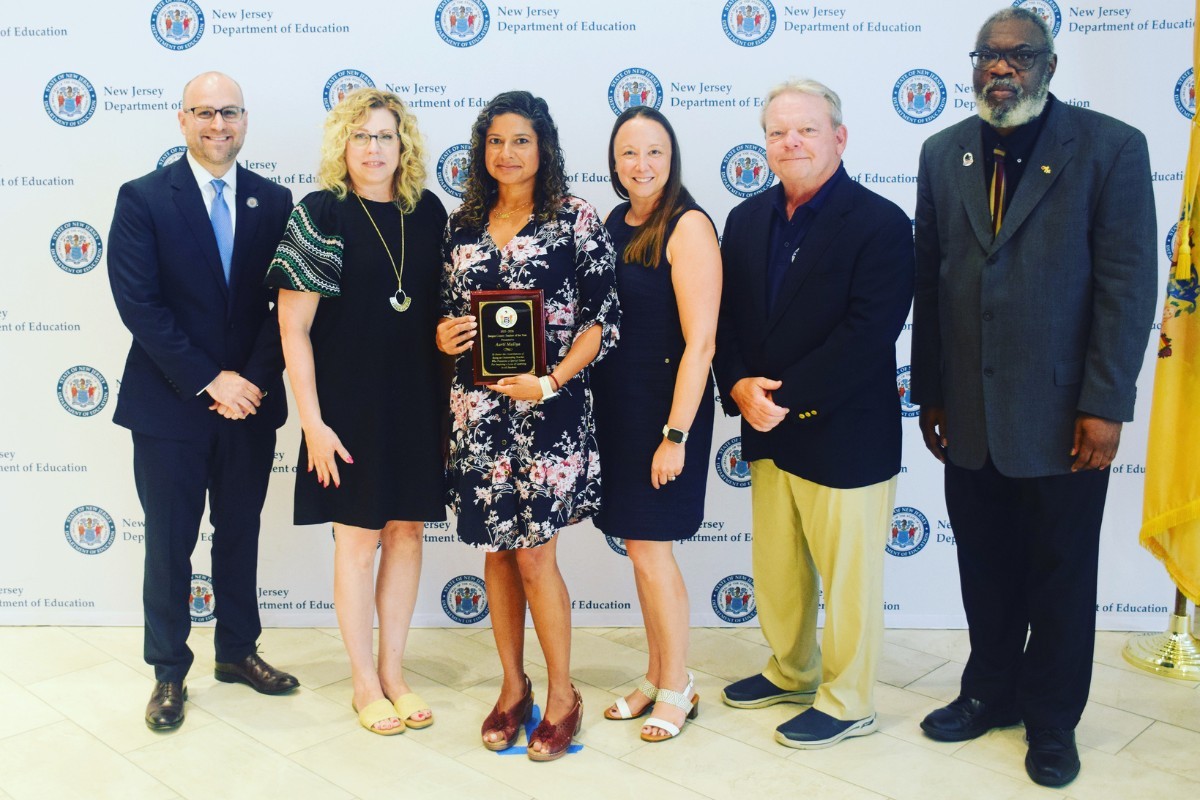In Aarti Mallya’s (Ph.D. ’09) high school biology classroom, the desks and chairs are arranged in a distinctive U-shaped seating layout, reminiscent of a college lecture hall. However, for Mallya, this thoughtful arrangement carries a deeper significance; it’s representative of what she calls a “learning community,” a philosophy that she employs in her classroom daily.
“My classroom, my teaching, it’s truly about cultivating a community of learners,” Mallya shares. “I aim to create an environment where my students feel safe, welcomed and supported. As an educator, I see it as my duty to nurture that sense of belonging.”
Now in her 25th year of teaching, Mallya has been awarded Bergen County’s 2025 Teacher of the Year Award for her exceptional contributions to education.“This award truly means a lot to me,” shares Mallya. “I am very fortunate to work with so many amazing teachers, students and colleagues, in my district, county, state and beyond, and I’m always learning from them.”
Teaching Insights from a New Jersey Teacher of the Year: Aarti Mallya (Ph.D. ’09)
Science Education Meets Creative Inquiry
Mallya began her journey at Teachers College in the Science Education program in 2006 bringing with her almost a decade of experience as a high school biology teacher. “I chose TC to enhance my ability to develop my pedagogy to be able to reach all of my students,” she explains. “The College was the perfect place to start, particularly because of the groundbreaking research being conducted by the faculty aimed at transforming science education.”
She dedicated her dissertation to extending science learning beyond the traditional classroom setting. In collaboration with TC’s Pam Koch and Isobel Contento, she co-authored an inquiry-based science and nutrition curriculum titled “Choice, Control and Change.”
“The curriculum was designed to empower students by illuminating the reasons behind making healthy choices, using scientific principles to inspire transformative changes in their everyday lives—whether it’s understanding the importance of healthy food choices or the benefits of regular physical activity,” Mallya explains. She and team implemented the curriculum in schools in the local Harlem and Washington Heights area, where they observed how students engaged with the curriculum, fostering a sense of agency that “enabled them to use the understandings they constructed in their science classrooms to influence their food and activity choices.”
Just months after leaving West 120th Street, the new TC alumna assumed her new role as the District Supervisor of Science and Technology Education in the Pascack Valley Regional High School District, where she served for over 13 years. “It was a great opportunity because I got to coach teachers, develop curriculum and work on shifting educators' perspectives around science learning,” she explains. “I was able to do so through a leadership lens, something that TC prepared me for over the years.”

(Photo courtesy of Mallya)
But for Mallya, all roads always led back to the classroom. “After the pandemic, I began to reflect on how much I missed teaching and working with students in a more hands-on way,” she explains. This realization led her to her current class roster, in which she teaches AP Biology and Honors Research in Molecular Genetics, as well as freshman biology. Her Research in Molecular Genetics course is also offered in partnership with the Waksman Institute of Microbiology at Rutgers University. “It has been gratifying to teach this course, as it enables students to conduct original research and present their findings annually at the North Jersey International Science and Engineering Qualifying Fair.”
The TC alumna underscores that science education goes beyond research alone. “It’s about guiding them [my students] to engage in experiences where they can use what they learn to participate in issues of personal and social significance.” In the research course, for example, students learn that they are contributing to a larger body of knowledge. "Each small piece —no matter how seemingly insignificant—plays a vital role in creating a bigger picture.”
But most importantly, Mallya describes her classroom as a “safe space” where students can come together to share ideas, learn and take creative risks. “It truly is a community,” she adds. “I often encourage my students with questions like, ‘Who thinks they have the best wrong answer?’ or ‘Who has a new idea?’ It’s all about fostering that sense of inquiry. Science is fundamentally about taking risks, and we navigate the challenges of sense-making together.”
Empowering Future Educators
When she’s not working with students in the lab, Mallya enjoys presenting at local and national conferences, sharing her insights on science instruction, curriculum development and student empowerment—skills she honed at TC. “During my time at TC, I thoroughly enjoyed presenting at education conferences along with my mentors, Felicia Mensah and Angela Calabrese-Barton. I learned so much from them,” she reflects. “I still use those skills when I present at conferences and events today.”
She also dedicates her time to giving back to fellow educators by serving as a mentor for aspiring teachers in her role as a Clinical Faculty Member at Montclair State University. “If I can share the insights I've gained throughout my journey and how they’ve contributed to my growth as an educator, I feel a responsibility to do so for the next generation of teachers,” she expresses.
Reflecting on her own teaching experiences, Mallya leaves future educators with one piece of advice: “Discover your strengths and leverage them. Don't hesitate to take risks or think outside the box. My time at Teachers College pushed me to embrace innovative thinking and truly transformed my approach to teaching—there are no limits to what you can achieve.”
